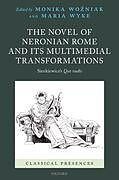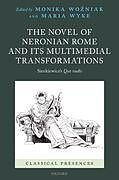The Novel of Neronian Rome and its Multimedial Transformations
Einband:
Fester Einband
EAN:
9780198867531
Untertitel:
Sienkiewicz's Quo vadis
Genre:
Kunst
Autor:
Monika (Associate Professor of Polish Lan Wozniak
Herausgeber:
Oxford Academic
Anzahl Seiten:
350
Erscheinungsdatum:
16.12.2020
ISBN:
978-0-19-886753-1
The Novel of Neronian Rome and its Multimedial Transformations: Sienkiewicz's "Quo vadis" is a significant contribution to the field of classical reception in general and specifically on the various permutations of Quo vadis. Whether within an individual chapter or section or the entire collection, teachers, students, and scholars of Nero, ancient Rome on screen, and the reception of Rome in general will find much useful and interesting material.
Autorentext
Monika Woniak is Associate Professor of Polish Language and Literature at the University of Rome 'La Sapienza'. Her research has addressed issues of literary translation, children's literature in translation, and audiovisual translation. She is co-author of Historia na ekranie. Gatunek filmowy a przekad audiowizualny (History on the Screen. Cinematographic Genre and Audiovisual Translation) (Kraków, 2018). She is co-editor of Cinderella across Cultures (Wayne University Press, 2016) and the conference proceedings Quo vadis: da caso letterario al fenomeno della cultura di massa (Rome, 2016). Maria Wyke is Professor of Latin at University College London. Her research interests include the reception of ancient Rome, especially in popular culture. She is the author of Projecting the Past: Ancient Rome, Cinema and History (Routledge, 1997), The Roman Mistress: Ancient and Modern Representations (OUP, 2000), Caesar: A Life in Western Culture (Granta and the University of Chicago Press, 2007), and Caesar in the USA (University of California Press, 2012). Wyke has edited or co-edited eight volumes to date, including The Ancient World in Silent Cinema (CUP, 2013), Julius Caesar in Western Culture (Blackwell, 2006), and The Uses and Abuses of Antiquity (Peter Lang, 1999).
Klappentext
This volume explores the historical novel Quo vadis written by the Polish author Henryk Sienkiewicz, examining how Sienkiewicz recreated Neronian Rome so vividly and the reasons why his novel was so avidly consumed and reproduced in new editions, translations, visual illustrations, and adaptations to the stage and screen.
Zusammenfassung
This volume explores the historical novel Quo vadis written by the Polish author Henryk Sienkiewicz, examining how Sienkiewicz recreated Neronian Rome so vividly and the reasons why his novel was so avidly consumed and reproduced in new editions, translations, visual illustrations, and adaptations to the stage and screen.
Inhalt
1: Monika Wöniak and Maria Wyke: Introduction
I. Literary Context
2: Jerzy Axer: The Paradoxes of Quo vadis: The Polish Classical Tradition in Action
3: Adam Zió kowski: Sienkiewicz and the Topography of Ancient Rome. The Riddle of Ostrianum in Quo vadis
4: Ewa Skwara: Costumes in Henryk Sienkiewicz's Quo vadis and Their Literary and Painterly Sources
5: Ruth Scodel: Quo vadis and Ancient Rome in the United States, 1896-1905
6: Comparing the Reception of Quo Vadis and Ben-Hur in the United States, 1896-1913
II. Quo vadis up to the Second World War
7: David Mayer: Quo vadis on the stage
8: Stella Dagna: Dangerous Liaisons: Quo vadis? (1913, dir. Enrico Guazzoni) and the Previous Theatrical Adaptations of Sienkiewicz's Novel
9: Maria Wyke: Word and Image: Competitive Adaptation in the Feature Film Quo vadis? (1913)
10: Raffaele De Berti and Elisabetta Gagetti: Illustrating Quo vadis in Italy (1900-1925): Between Cultivated Tradition and Popular Culture
11: Ewa Górecka: Horror amid Sweetness: Kitsch and the Intertextual Strategies of Quo vadis Postcards
III. Quo vadis post the Second World War
12: Jonathan Stubbs: 'A more permanent world': Quo Vadis (1951), Runaway Production, and the Internationalisation of Hollywood
13: Martin M. Winkler: M-G-M's QVO VADIS: From Historical Fiction to Screen Spectacle
14: Monika Wöniak: 'O omnivorous powers, hail!': Film Dialogue in Quo Vadis (1951)
15: Monica dall'Asta and Alessandro Faccioli: Ursus as a Serial Figure
16: El bieta Ostrowska: The (In)discreet Charm of the Romans: Quo vadis (dir. Jerzy Kawalerowicz, 2001)

Leider konnten wir für diesen Artikel keine Preise ermitteln ...
billigbuch.ch sucht jetzt für Sie die besten Angebote ...
Die aktuellen Verkaufspreise von 6 Onlineshops werden in Realtime abgefragt.
Sie können das gewünschte Produkt anschliessend direkt beim Anbieter Ihrer Wahl bestellen.
Loading...
Die aktuellen Verkaufspreise von 6 Onlineshops werden in Realtime abgefragt.
Sie können das gewünschte Produkt anschliessend direkt beim Anbieter Ihrer Wahl bestellen.
| # | Onlineshop | Preis CHF | Versand CHF | Total CHF | ||
|---|---|---|---|---|---|---|
| 1 | Seller | 0.00 | 0.00 | 0.00 |
